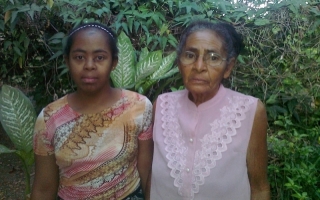
“My attorney was bought off by the other party,” she said. Caridad hired the attorney Yolanda Martiato Sanchez in January 2009. In June, without her consent, her counsel filed a notice of withdrawal that the Court of Havana accepted. Proceedings were closed. “I knew of the deception when I complained to the Council of State and they responded to me in court,” says Caridad.
“I complained, but the director of client relations at the Law Collective Center of the Ministry of Justice said the withdrawal that was done behind my back caused me no harm,” she explains. In August, Martiato Sanchez had opened a new process for challenging the trade. But in February 2010 she was replaced by a colleague, Mr. Manuel Guzman. “As expected, the court dismissed the lawsuit,” said Caridad.
The judges felt that there was no absence of consent or fraud. According to them, the precarious state of the property was not hidden by the defendant. Now, the situation Caridad finds herself in is due to her “carelessness” and “negligent behavior.” However, to reach the ruling, it required a report from the Office of the Architect of the Community (OAC) of Arroyo Naranjo.
It was the same institution that, in October 2008, issued a technical report which according to Mrs. Cruz de Armas when she answered the complaint, accredited “the good technical condition of the property.” To date, Caridad Reyes has been unable to obtain a copy of that document.
Instead, at the request of Caridad herself, the OAC issued a new opinion in January 2009, with the result that the housing no longer met the requirements of habitability and therefore could not be considered “minimally adequate housing.” The document was signed by architect Elena Perez, Head of the institution and Caridad’s adjoining neighbor.
Cronyism, corruption
Elena Perez, chief of the OAC, is friends with Mrs. Ofelia de la Cruz de Armas, the woman sued by Charity; also because of the position she occupies, with attorney Martiatos Sanchez and the officials of Directorate of Municipal Housing of Arroyo Naranjo (DMV). The Havana Court however, ignored the conflict of interest and asked Elena Perez to appoint two experts to certify the construction technical condition of Caridad Reyes’ housing.
According to the report, the structural characteristics of the building were altered by construction that Caridad never undertook. “The heedlessness cannot not attributed to a fraudulent act of the other party,” the court ruled.
The fact is that in less than three months, the housing changed and no longer met the housing habitability requirements. This, however, did not suggest to the judges that the opinion of the OAC was falsified. Nothing made them suspect the architect, the DMV officials and the acting notary, nor the possible crime of falsification of documents.
But Caridad Reyes did not desist. She hired another lawyer, and while her appeal was dismissed by the Supreme Court, she asked the Arroyo Naranjo Municipal Housing Office to nullify the resolution authorizing the exchange. The request was denied and the case closed. And Caridad Reyes Roca sued the institution. The former Havana Hearing Examiner declared her request without merit. Caridad appealed to the Supreme Court and got the same answer.
The same OAC, in 2012, issued another Technical Report. The property, it notes, remains in poor condition, but it does not specify if it is uninhabitable and irreparable. The construction is devalued by 4,356.15 pesos in national currency (from the value it had when the trade was made) to 2,678.16 national pesos
Caridad Reyes filed written complaints at different levels of government: Provincial and Supreme Court, National Assembly, Council of State, the National Housing Institute, Ministry of Justice, the National Organization of Law Collectives and the Attorney General’s Office.
No investigation got to the bottom of the matter or evaluated the risk to her physical safety and that of her daughter, even though both belong to vulnerable social groups. Caridad Reyes Roca, 65, is retired, and is responsible for Misley Lázara Suarez, 30-years-old with Down syndrome.
Their lives are in danger because of the unsanitary conditions of the home. The wastewater must be manually evacuated. They sleep in the kitchen because of the risks of collapse in the bedroom. Reyes Roca suffers from urosepsis and chronic gastroenteritis. She has difficulties with antibiotic resistant bacteria such as Staphylococcus aureus.
What are the authorities waiting for? For the ceiling to fall on their heads? What will happen to Misley Lázara if Caridad is not there to care for her? Those who because of their ambition deceived this elderly mother of a disabled child didn’t think about that.
Cronyism abounds in the Cuban legal system.
Laritza Diversent
Translated from DiariodeCuba.com
21 January 2013
